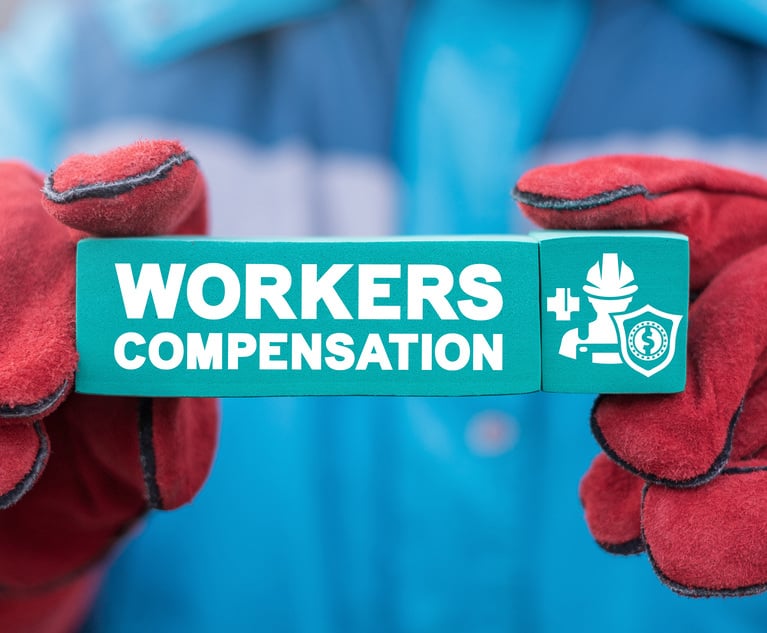Consider for a moment where we would be—as a society, an economyand an insurance industry—without workers' compensation.
|With workers' compensation celebrating its centennial this year, itis worthwhile to examine just how big an impact this critical lineof coverage has had on our lives.
|First, a quick history lesson.
|We're just a few weeks away from the system's 100thbirthday—Sept. 1, 1911, when the first workers' compensation lawtook effect in Wisconsin. For many workers, it was a grim time.Workplace deaths were far more frequent compared with today'srelatively few fatalities. Families were often left destitute ifthe breadwinner suffered a catastrophic injury or became illbecause of his job.
|We now take workers' compensation for granted, but a century agothe notion of government imposing financial obligations onemployers and limiting legal rights for employees was prettyradical and controversial. Many employers (as well as legislatorsand state judges) considered the very concept of mandatory workers'compensation unconstitutional. Unions often opposed initial effortsto establish the workers' compensation system as an “exclusiveremedy,” concerned that business lobbyists would convincegovernment to set unacceptably low benefit levels and leave themwithout recourse to the courts.
|Unions argued that workers had more to gain by suing theiremployers. Some even suggested that workers' compensation woulddiscourage companies from making their workplace safer bytransferring the risk and cost of injuries to third-partyinsurers.
|Related:Read More Sam Friedman Blog Posts
|In truth, the legal deck was stacked against injured workerswithout a workers' compensation system in place, and workplacesafety was already a low priority for too many companies. Employersthat were sued were able to escape blame and liability with anumber of legal defenses, including if the employee knew about apotential hazard beforehand, or if a fellow employee was evenpartly to blame for an accident.
|Indeed, with no uniform system in place to care for those whowere hurt or became ill on the job, it was pretty much every manand woman for themselves if an accident occurred.
|Wisconsin Led the Way
|Events such as the infamous Triangle Shirtwaist factory fire that killed 146 garmentworkers in New York in March of 1911 shined a harsh spotlight onthe unsafe working conditions under which many were routinelytoiling. It also exposed the lack of a reliable safety net torehabilitate and compensate those hurt on the job and unable towork for a time (or ever again), as well as take care of thefamilies of those who lost their lives.
||(The New York Court of Appeals rejected New York's firstworkers' compensation law as unconstitutional the day before thetragic Triangle fire, citing a violation of employer's due processrights. The state went on to change its constitution after theTriangle fire and activated its own workers' compensation system in1914.)
|Once Wisconsin took the plunge and put workers' compensation onthe map, however, the system expanded nationwide fairly quickly. By1920, only eight states lacked workers' compensation laws; by 1949,each state had a system in place.
|Related: Workers' CompensationEducational Conference
|What if opponents had succeeded in heading off the creation ofworkers' compensation? Consider for a moment that we inhabit analternative universe. Imagine what life would be like without thisinsurance. We would likely see:
- Far more litigation, resulting in much higher legal costs foremployers;
- More injured workers going without proper treatment and havingto wait months or years for replacement income and compensation, ifthey received any benefits at all;
- Longer absences from work and far fewer injured partiesreturning to their jobs even in a part-time or “light-duty”capacity, resulting in lower productivity overall; and
- A far more combative workplace, and perhaps even a morebelligerent union movement, as employees would have been morelikely to organize to secure fair treatment for members hurt orkilled on the job.
Would we have also seen many more injured workers without asystem in place to keep employers focused on loss control? Thethreat of litigation and increased union activity might haveeventually driven employers to improve workplace safety regardlessof whether workers' compensation came into being, but that wouldhave been a much tougher road to travel to produce the relativelysafe working environments we typically enjoy today.
||In any case, the impact of workers' compensation has indeed beenimmense and overwhelmingly positive. Consider that it:
- Created a humane risk-transfer system that has spread theburden of paying and treating injured employees.
- Largely removed the need for injured workers to sue theiremployers (although some would say there is still far too muchlitigation in the system).
- Freed injured and sick workers from having to pay doctors outof their own pockets if their job was responsible for their medicalcondition.
- Integrated a loss control mentality into the social compactthat greatly reduced the frequency of workplace injuries andfatalities. (Fears of workers' compensation creating a “moralhazard” because third parties—insurers—were paying claims insteadof employers were eased by the experience-based rating system,which offered a powerful financial incentive to provide a safeworkplace.)
The insurance industry is certainly grateful for the business.Workers' compensation ranks fourth in premiums generated amongproperty & casualty lines, trailing only private passengerauto, homeowners' multi-peril, and “other liability,” according tothe Insurance Information Institute. Even with a recession-dampened$32 billion in net written premiums in 2009 (the total was nearly$42 billion in 2006), the line accounted for about 7.5 percent oftotal P&C premium volume that year.
|Workers' compensation is not perfect. Litigation is still fartoo prevalent in a supposedly “exclusive-remedy” system. Theprivate insurance market has failed to thrive in too many states,thanks in large part to excessive regulation. Medical care costs,particularly for prescription drugs, are still soaring.
|Yet whether you are considering the health of the economy, thesociety at large, or of the insurance industry in particular, aswell as your own personal well-being and peace of mind, it would bedifficult to argue that we'd be better off without workers'compensation.
|Sam J. Friedman, Insurance Leader at Deloitte Research, willfurther discuss the impact of worker's compensation and thechallenges the industry faces over the next century during theWorkers'Compensation Educational Conference in Orlando on Aug. 23. Hemay be reached at [email protected].
Want to continue reading?
Become a Free PropertyCasualty360 Digital Reader
Your access to unlimited PropertyCasualty360 content isn’t changing.
Once you are an ALM digital member, you’ll receive:
- All PropertyCasualty360.com news coverage, best practices, and in-depth analysis.
- Educational webcasts, resources from industry leaders, and informative newsletters.
- Other award-winning websites including BenefitsPRO.com and ThinkAdvisor.com.
Already have an account? Sign In
© 2024 ALM Global, LLC, All Rights Reserved. Request academic re-use from www.copyright.com. All other uses, submit a request to [email protected]. For more information visit Asset & Logo Licensing.








